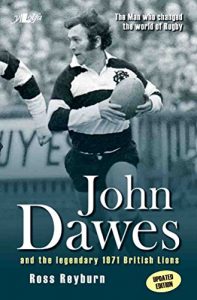A biography of the early life and the playing career of John Dawes, the London Welsh, British Lions (1971) and Barbarians captain. The biography is the result of extensive interviews, with a postscript giving a current analysis detailing Dawes' place in rugby history as one of rugby's greatest innovators. Over 30 images.
John Dawes is one of the most fascinating characters in the long history of Welsh rugby, and this is a fascinating perspective on him. Originally written thirty years ago, when the ‘quiet giant’ of London Welsh, Wales, the Lions and Barbarians was at the peak of his fame and influence, it failed to find a publisher, and only now is it reaching an audience.
Dawes was a contemporary of much more glamorous figures including Gareth Edwards, JPR, Barry John and Mervyn Davies, and is remembered now primarily for his captaincy and tactical skills. ‘Too old and too slow’, commented the legendary Bleddyn Williams on one of Sid’s recurrent recalls to the Welsh team, and many believed he always lacked that ‘yard of pace’ essential at international level. We are reminded of the early travails of ‘The Great Entertainer’ Shane Williams, dismissed even in recent years as ‘too small’ amongst our current giant three-quarters. As Reyburn points out, Dawes’ pace was in his vision and the timing of his pass, and it was the selectors and pundits wearing bifocals. He only became a regular Wales player at the age of thirty but, from then on, Six Nations triumphs, the Lions’ victory in New Zealand in 1971, and that legendary swansong when he inspired the Barbarians to defeat the All Blacks in 1973, demonstrated to the doubters what six golden years of London Welsh rugby should have already proved: the man was a genius.
Reyburn follows Sid’s career from Newbridge through London Welsh, the team he transformed as captain and coach into the exemplar of creative running rugby, then examines the great Wales and Lions teams of the early seventies. He argues convincingly that their charismatic figures flowered and matured during Dawes’ captaincy, and a clear creative thread can be followed from his ideas and methods to those of Graham Henry and Warren Gatland today. (Meic Lewellyn, Gwales.Com)
John Dawes is one of the most fascinating characters in the long history of Welsh rugby, and this is a fascinating perspective on him. Originally written thirty years ago, when the ‘quiet giant’ of London Welsh, Wales, the Lions and Barbarians was at the peak of his fame and influence, it failed to find a publisher, and only now is it reaching an audience.
Dawes was a contemporary of much more glamorous figures including Gareth Edwards, JPR, Barry John and Mervyn Davies, and is remembered now primarily for his captaincy and tactical skills. ‘Too old and too slow’, commented the legendary Bleddyn Williams on one of Sid’s recurrent recalls to the Welsh team, and many believed he always lacked that ‘yard of pace’ essential at international level. We are reminded of the early travails of ‘The Great Entertainer’ Shane Williams, dismissed even in recent years as ‘too small’ amongst our current giant three-quarters. As Reyburn points out, Dawes’ pace was in his vision and the timing of his pass, and it was the selectors and pundits wearing bifocals. He only became a regular Wales player at the age of thirty but, from then on, Six Nations triumphs, the Lions’ victory in New Zealand in 1971, and that legendary swansong when he inspired the Barbarians to defeat the All Blacks in 1973, demonstrated to the doubters what six golden years of London Welsh rugby should have already proved: the man was a genius.
Reyburn follows Sid’s career from Newbridge through London Welsh, the team he transformed as captain and coach into the exemplar of creative running rugby, then examines the great Wales and Lions teams of the early seventies. He argues convincingly that their charismatic figures flowered and matured during Dawes’ captaincy, and a clear creative thread can be followed from his ideas and methods to those of Graham Henry and Warren Gatland today. (Meic Lewellyn, Gwales.Com)






